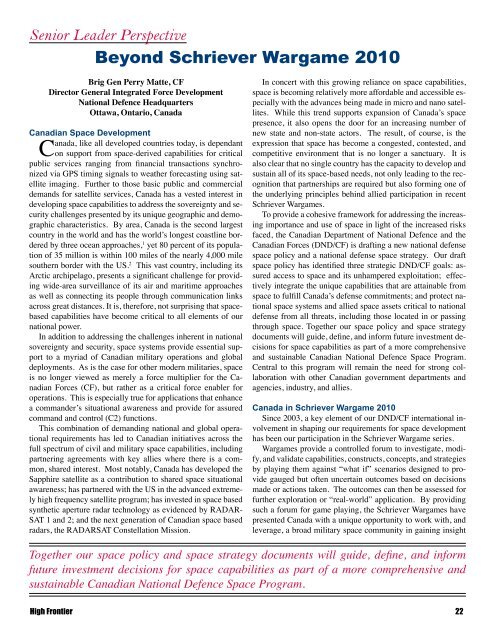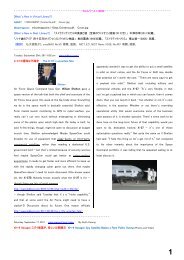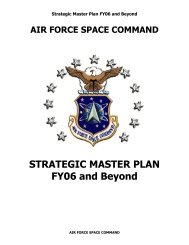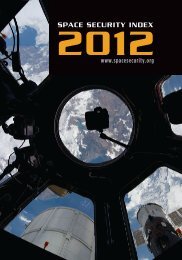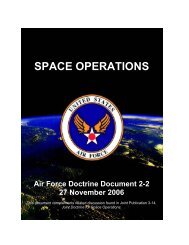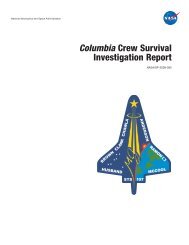Schriever Wargame 2010 - Air Force Space Command
Schriever Wargame 2010 - Air Force Space Command
Schriever Wargame 2010 - Air Force Space Command
Create successful ePaper yourself
Turn your PDF publications into a flip-book with our unique Google optimized e-Paper software.
Senior Leader Perspective<br />
Beyond <strong>Schriever</strong> <strong>Wargame</strong> <strong>2010</strong><br />
Brig Gen Perry Matte, CF<br />
Director General Integrated <strong>Force</strong> Development<br />
National Defence Headquarters<br />
Ottawa, Ontario, Canada<br />
Canadian <strong>Space</strong> Development<br />
Canada, like all developed countries today, is dependant<br />
on support from space-derived capabilities for critical<br />
public services ranging from financial transactions synchronized<br />
via GPS timing signals to weather forecasting using satellite<br />
imaging. Further to those basic public and commercial<br />
demands for satellite services, Canada has a vested interest in<br />
developing space capabilities to address the sovereignty and security<br />
challenges presented by its unique geographic and demographic<br />
characteristics. By area, Canada is the second largest<br />
country in the world and has the world’s longest coastline bordered<br />
by three ocean approaches, 1 yet 80 percent of its population<br />
of 35 million is within 100 miles of the nearly 4,000 mile<br />
southern border with the US. 2 This vast country, including its<br />
Arctic archipelago, presents a significant challenge for providing<br />
wide-area surveillance of its air and maritime approaches<br />
as well as connecting its people through communication links<br />
across great distances. It is, therefore, not surprising that spacebased<br />
capabilities have become critical to all elements of our<br />
national power.<br />
In addition to addressing the challenges inherent in national<br />
sovereignty and security, space systems provide essential support<br />
to a myriad of Canadian military operations and global<br />
deployments. As is the case for other modern militaries, space<br />
is no longer viewed as merely a force multiplier for the Canadian<br />
<strong>Force</strong>s (CF), but rather as a critical force enabler for<br />
operations. This is especially true for applications that enhance<br />
a commander’s situational awareness and provide for assured<br />
command and control (C2) functions.<br />
This combination of demanding national and global operational<br />
requirements has led to Canadian initiatives across the<br />
full spectrum of civil and military space capabilities, including<br />
partnering agreements with key allies where there is a common,<br />
shared interest. Most notably, Canada has developed the<br />
Sapphire satellite as a contribution to shared space situational<br />
awareness; has partnered with the US in the advanced extremely<br />
high frequency satellite program; has invested in space based<br />
synthetic aperture radar technology as evidenced by RADAR-<br />
SAT 1 and 2; and the next generation of Canadian space based<br />
radars, the RADARSAT Constellation Mission.<br />
In concert with this growing reliance on space capabilities,<br />
space is becoming relatively more affordable and accessible especially<br />
with the advances being made in micro and nano satellites.<br />
While this trend supports expansion of Canada’s space<br />
presence, it also opens the door for an increasing number of<br />
new state and non-state actors. The result, of course, is the<br />
expression that space has become a congested, contested, and<br />
competitive environment that is no longer a sanctuary. It is<br />
also clear that no single country has the capacity to develop and<br />
sustain all of its space-based needs, not only leading to the recognition<br />
that partnerships are required but also forming one of<br />
the underlying principles behind allied participation in recent<br />
<strong>Schriever</strong> <strong>Wargame</strong>s.<br />
To provide a cohesive framework for addressing the increasing<br />
importance and use of space in light of the increased risks<br />
faced, the Canadian Department of National Defence and the<br />
Canadian <strong>Force</strong>s (DND/CF) is drafting a new national defense<br />
space policy and a national defense space strategy. Our draft<br />
space policy has identified three strategic DND/CF goals: assured<br />
access to space and its unhampered exploitation; effectively<br />
integrate the unique capabilities that are attainable from<br />
space to fulfill Canada’s defense commitments; and protect national<br />
space systems and allied space assets critical to national<br />
defense from all threats, including those located in or passing<br />
through space. Together our space policy and space strategy<br />
documents will guide, define, and inform future investment decisions<br />
for space capabilities as part of a more comprehensive<br />
and sustainable Canadian National Defence <strong>Space</strong> Program.<br />
Central to this program will remain the need for strong collaboration<br />
with other Canadian government departments and<br />
agencies, industry, and allies.<br />
Canada in <strong>Schriever</strong> <strong>Wargame</strong> <strong>2010</strong><br />
Since 2003, a key element of our DND/CF international involvement<br />
in shaping our requirements for space development<br />
has been our participation in the <strong>Schriever</strong> <strong>Wargame</strong> series.<br />
<strong>Wargame</strong>s provide a controlled forum to investigate, modify,<br />
and validate capabilities, constructs, concepts, and strategies<br />
by playing them against “what if” scenarios designed to provide<br />
gauged but often uncertain outcomes based on decisions<br />
made or actions taken. The outcomes can then be assessed for<br />
further exploration or “real-world” application. By providing<br />
such a forum for game playing, the <strong>Schriever</strong> <strong>Wargame</strong>s have<br />
presented Canada with a unique opportunity to work with, and<br />
leverage, a broad military space community in gaining insight<br />
Together our space policy and space strategy documents will guide, define, and inform<br />
future investment decisions for space capabilities as part of a more comprehensive and<br />
sustainable Canadian National Defence <strong>Space</strong> Program.<br />
High Frontier 22


